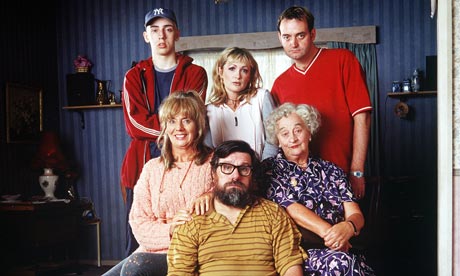
At the turn of the century, Liz Smith in The Royle Family offered that immortal line about Anthony's new vegetarian girlfriend: "Could she just have some wafer-thin ham?". Still wonderful, and still true, to judge by the reaction to the "news" about the links between red meat and cancer. Which remains indigestible. Everything gives you cancer. More mustard on my hotdog, please.
Caroline Aherne brilliantly nailed the connection between class, diet and health, but I am afraid we continue to be fed gobbets of congealed and mysteriously processed information all the time.
Is this helpful? I have certainly had to think about eating meat as I am the mother of three girls who have all been vegetarian for long periods – as I was once myself. My youngest has been the most trying as she is militant but does not like most vegetables. At one point I resorted to The Smith's Meat is Murder, thinking it might have put her off. But, no, she thinks Morrissey is right "even though he can't sing and looks like that". Here's a tip, Simon Cowell! Get Zayn out of One Direction to do Meat is Murder and you will really cover all the bases.
My issue is not with her vegetarianism, but with trying to keep her healthy. Subsisting on low-fat mould (Quorn) is not the most fun I have had with my hemp clothes on. But much of the discussion on meat is not in any way rational, but purely emotional. The way most animals are kept and killed is obviously abhorrent. But vegetarianism is not an isolated belief system: it intersects with class, culture, religion and, inevitably, gender.
Yep, the old meat and two veg issue. Meat may not be murder but meat is macho. Hence the hissy fits of the likes of Gordon Ramsay, who for ever has to overplay his butchness. Or should that be butcherness? "If one of my daughters' boyfriends turns out to be vegetarian, I swear to God I'd never forgive them," he has said. What an ignorant thing to say. If you are what you eat, then Ramsay is dead flesh already.
The ethical arguments around the way we treat animals are worth having. We could use meat to flavour a meal rather than as the basis of it, as I learned in Thailand, where I was also taught that if you kill an animal you should use every part of it. Most of us know about the cruelty but we turn a blind eye.
Hugh Fearnley-Whittingstall, who appears to have eaten just about everything (admission: so have I! You don't want to know) caused a stir by saying we could eat puppies if they were organically farmed as "it's a cultural decision to make pets out of dogs and meat out of pigs". This may send many a bit loopy-loo, but he is right. The same folk will go gaga over meat grown from stem cells in a petri dish, but I don't see why. Bring on the Frankenmeat!
Now most of my household eats meat, as I do. After 10 years of solid vegetarianism, my eldest went to live in Bolivia and gave up. Well, I should have known. When she went on a school trip to Spain she came back starving (or hysterical, as her teacher put it), for the vegetarian packed lunch in Spain was … yes … a Royle Family-style ham sandwich. Actually, in trying to decipher this latest study with its emphasis on cured and smoked meats being especially cancer-inducing, I did wonder about all that delicious Spanish food.
Health-wise, the message seems to be that some meat is OK but the processed stuff, ie the meat that poor people eat, is not. This is why dietary advice spat out into a vacuum that takes no account of budget or class is worse than useless. The decision not to eat meat may be both personal and political or entirely culturally or religiously determined. I have never felt healthier than when I spent a couple of months in the south of India, eating fish and coconut wrapped in banana leaf. The diet is meat-free and gorgeous.
So when I had my first child, I felt no need to give her meat (smellier nappies). But on a visit to my mum, she informed the neighbours that I had postnatal depression ("She reads all the time"), and we had a ridiculous fight over Mum giving my vegetarian child mashed food with gravy made from meat juice. I said she did not need it.
"What do you think you are made of?" my mother yelled . "Star stuff," I said, as we all loved Carl Sagan. And I waited for the inevitable bit of working-class philosophy that would blow me away. And it did. "Rubbish. Do you want a child made of gristle with no bones?" "No Mum." "Then face facts. You may live in London now, but you are made of gravy. Just like the rest of us."

